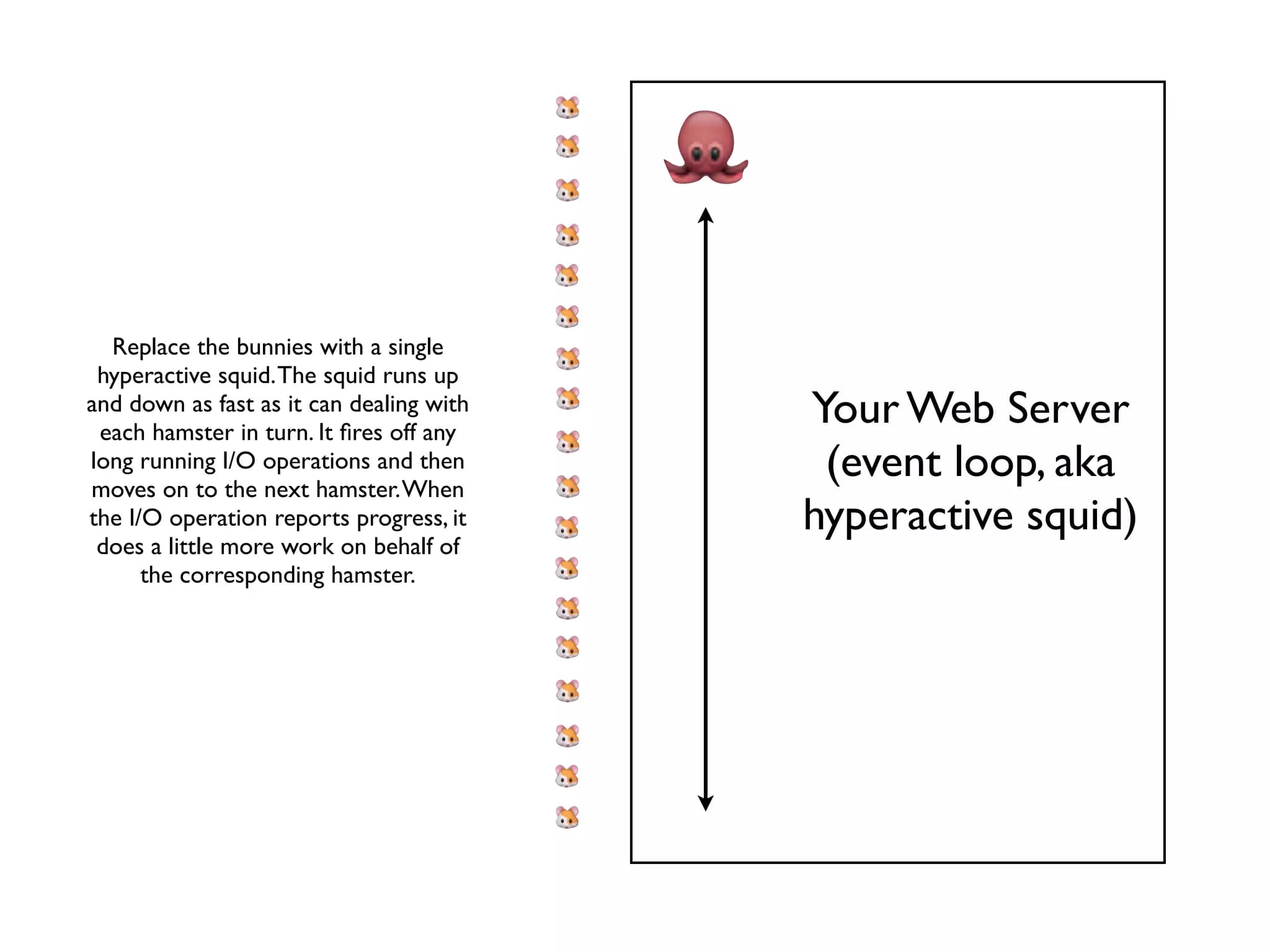27 posts tagged “couchdb”
2010
What are the advantages and disadvantages of using MongoDB vs CouchDB vs Cassandra vs Redis?
I see Redis as a different category from the other three—kind of like you wouldn’t say “what are the advantages of MySQL v.s. Memcached”. Redis makes an excellent complement to pretty much any other persistent storage mechanism. I expanded on this here: http://simonwillison.net/2009/Oc...
[... 67 words]A Gentle Introduction to CouchDB for Relational Practitioners. By “High Performance MySQL” author Baron Schwartz—a smart, concise overview that touches pretty much everything that’s interesting about CouchDB.
What is the largest production deployment of CouchDB for online use?
The BBC have a pretty big CouchDB cluster, which they use mostly as a replicated key-value store. It’s used by their new identity platform which includes customisation features for iPlayer.
[... 47 words]2009
CouchDB View Cookbook for SQL Jockeys. This demystified CouchDB views for me. From “CouchDB: The Definitive Guide”, the free online manual.
Node.js is genuinely exciting
I gave a talk on Friday at Full Frontal, a new one day JavaScript conference in my home town of Brighton. I ended up throwing away my intended topic (JSONP, APIs and cross-domain security) three days before the event in favour of a technology which first crossed my radar less than two weeks ago.
[... 2,025 words]Simple CouchDB multi-master clustering via Nginx. An impressive combination. CouchDB can be easily set up in a multi-master configuration, where writes to one master are replicated to the other and vice versa. This makes setting up a reliable CouchDB cluster is as simple as putting two such servers behind a single nginx proxy.
Desktop Couch initial code. More from Stuart Langridge on the project to make CouchDB available as a desktop service, providing free synchronisation between machines and a way for different applications to interrogate each other’s structured data.
MongoDB. Lots of discussions about this at EuroPython today—it’s a document database, very similar to CouchDB but significantly faster and suggested for production use. Best of all, trying it out on OS X is as easy as extracting the tarball and running “bin/mongod --dbpath /tmp/test-mongo-db run”.
whine flu, railsmalefail 2009. Danny quotes the smartest take on the CouchDB/pr0n controversy: “It’s about presenting women as ’the other,’ not ’us.’ It would have been just as offensive if all the women shown were domineering mothers in aprons, shaking their fingers and threatening with rolling pins.”
Installing CouchDB from source on OS X. So far I’ve just been playing with it in an Ubuntu virtual machine.
New PylonsHQ Site Launches. The new site uses CouchDB instead of a relational database, and the code for the site is open source so you can see how it all works.
Rules of Database App Aging. Peter Harkins: All fields become optional, all relationships become many-to-many, chatter always expands. This is why document oriented databases such as CouchDB are looking more and more attractive.
2008
GeoCouch: Geospatial queries with CouchDB. Interesting approach: uses “external2”, a branch that allows external services to be called from CouchDB. SQLite’s SpatiaLite extension is then used as an external spacial index.
Persevere adds Comet Support. Persevere sounds neat: a RESTful HTTP/JSON data store (the interface reminds me of CouchDB) which recently gained the ability to “subscribe” to a resource and receive notifications of updates via comet.
Multi-Inflection-Point Alert. Dammit, Tim, stop giving away our competitive advantages!
What Sucks About Erlang. Damien Katz shares his greatest frustrations from working with Erlang on CouchDB.
CouchDB, XML, and E4X. Brilliant—CouchDB now enables SpiderMonkey’s E4X support, meaning CouchDB views can easily query XML documents stored inside JSON objects using E4X syntax.
Damien Katz: New Gig. IBM have employed Damien Katz to work full time on CouchDB. The work will be under the Apache license with the ASF owning the copyright.
2007
CouchDB Roundup. The CouchDB project is interested in contributions from people who can write a large file driver for Erlang, help figure out the CouchDB security model and build scripts to help benchmark performance, scalability and reliability.
Call for Participation for XTech 2008. XTech 2008 will be in Dublin, Ireland from the 6th to the 9th of May. Lots of really interesting topics in the CfP (OpenID, OAuth, Comet, CouchDB...)—deadline for submissions is the 25th of January.
[Release] CouchDB 0.7.0. This is a huge milestone for the project—it’s the first official release to include the JSON REST API instead of XML, and it’s also the first release that is “intended for widespread use”.
CouchDB “Joins”. Different approaches to indexing a blog post and its associated comments in the non-relational CouchDB.
Django may be built for the Web, but CouchDB is built of the Web. I've never seen software that so completely embraces the philosophies behind HTTP. CouchDB makes Django look old-school in the same way that Django makes ASP look outdated.
CouchDB first impressions. Jacob’s been poking at CouchDB. Inserting data is slow, but everything else looks pretty slick considering how recently the JSON / JavaScript views functionality was added.
A CouchDB GUI front end. Written in C# and .NET. It looks like writing frontends for CouchDB could make an excellent project for learning a new GUI environment.
CouchDb: Some Context. CouchDb developer Jan Lehnardt wrote up detailed notes on slides from a presentation he gave back in June, explaining most of what’s interesting about CouchDb (although without the new JavaScript function query language).
CouchDB: Thinking beyond the RDBMS. CouchDB is a fascinating project—an Erlang powered non-relational database with a JSON API that lets you define “views” (really computed tables) based on JavaScript functions that execute using map/reduce. Damien Katz, the main developer currently works for MySQL and used to work on Lotus Notes.
